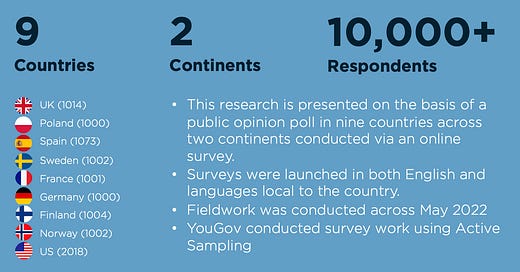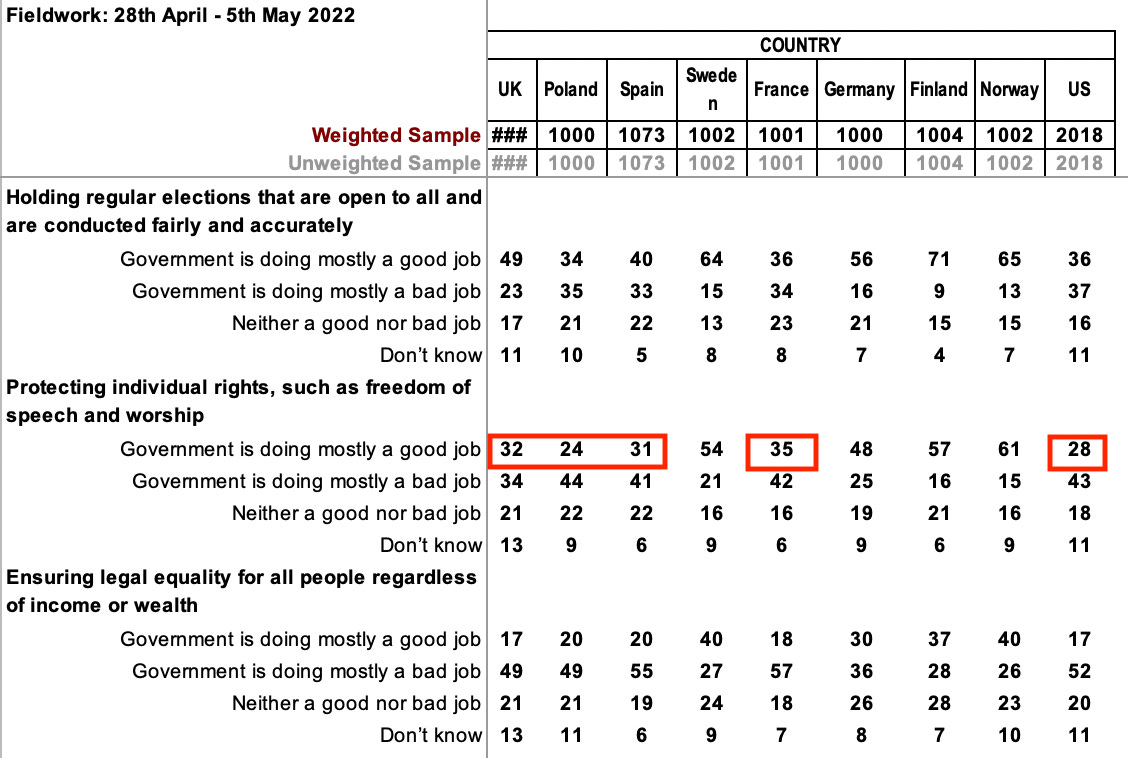The Democratic Deficit in the West
New polling across 9 countries finds citizens displeased with the state of democracy at home. But they support defending democracy in the world—and specifically in Ukraine—within limits.
Russia’s war on Ukraine has focused the world’s attention on the ideological battle between liberal democracy and totalitarianism—systems of government based on national sovereignty, freedom, the rule of law, and individual rights versus those based on military aggression, societal repression, one-party rule, and state control of people’s lives. President Biden and European leaders clearly understand the stakes in this conflict and so far, they have remained united in supporting Ukraine’s fight against Russia’s criminal actions. As Biden stated in early May, “We either back the Ukrainian people as they defend their country or stand by as Russia continues its atrocities and aggression.”
But as the war in Ukraine enters its fourth month, where do the people of western nations stand on defending liberal democracy and democratic freedoms—both at home and abroad?
To get at this and other fundamental questions about how democratic countries are performing today, Global Progress and YouGov conducted the most comprehensive multi-national survey to date examining public attitudes about democratic delivery at home and beliefs about the war in Ukraine. The survey was conducted in early May 2022 with more than 10,000 respondents in 9 western countries to allow for both in-country analysis and comparisons across national borders. TLP was fortunate to help with the design and analysis of this research, along with earlier waves of Global Progress research released ahead of the G7 meeting in Cornwall and the G20 summit in Rome. Combined, these research projects offer unique empirical findings about transnational attitudes on emerging global challenges from the economy and clean energy to immigration and security threats from Russia and China.
This current research offers a clear picture of an emerging democratic deficit in many western countries. Many citizens surveyed express serious concerns about the state of democracy in their home countries. Yet, on the whole, they continue to support democracy in principle and back actions to defend democracy abroad, specifically in Ukraine, within certain limits.
Many democratic nations are failing to deliver at home. The first batch of critical findings in this research involve attitudes about democracy at home. Respondents were asked, “In general, how well or badly do you think democracy (that is, having people elect politicians to make decisions) is working in your country?” Overall, across all 9 countries, 41 percent of citizens say that democracy is working either fairly badly or very badly in their country, with noticeable variations in beliefs that democracy is working well. For example, as seen in the chart below, roughly 60-70 percent of those in Sweden, Germany, Finland, and Norway believe that democracy is working well in their home countries compared to just 40 percent of those in the United Kingdom, Poland, Spain, France, and the United States.
As a follow-up, respondents were asked whether the government in their country does mostly a good job or mostly a bad job in upholding a range of democratic goals. The results are disconcerting outside of the Nordic countries in the survey (and Germany in some instances). As seen in the table below:
Less than half of the citizens in the United Kingdom, Poland, Spain, France, and the United States believe their governments are doing a good job of “holding regular elections that are open to all and conducted fairly and accurately.”
Less than one third of citizens in these same 5 countries believe their governments are doing a good job “protecting individual rights, such as freedom of speech and worship.”
And a mere one fifth of citizens in these same nations feel that their governments are doing a good job “ensuring legal equality for all people regardless of income or wealth.”
Likewise, as seen in the chart below, less than 3 in 10 citizens across all 9 western countries say their governments are doing a good job “providing adequate social protections for the elderly, poor, and vulnerable,” with nearly half of people on average rating their governments poorly on this measure. And less than half of citizens in these countries believe their governments are performing well in “supporting a strong and growing economy.”
Fortunately, despite clear deficiencies in delivering on democratic promises at home, majorities of citizens in these leading nations favor democracy over an authoritarian, strong-man alternative. More than 6 in 10 citizens on average say it is “more important for a country to have a leader whose decisions can be properly criticized and held to account by opposing politicians, judges, or media” rather than the alternative of having a leader “who is able to take action, without being held back” by these democratic constraints. Notably, support for strong-man alternatives is highest in Poland and the United States, where 36 percent and 28 percent of citizens, respectively, prefer an authoritarian concept of leadership over a democratic one.
Looking at the larger picture, majorities of citizens in 8 of these 9 western countries, with France being the exception, believe that democratic countries tend to have more effective governments than authoritarian ones. More than half of the people in 7 of these 9 countries, with the U.K. and France being exceptions, also feel that democratic countries tend to have richer and more successful economies.
Looking at all of these findings, it’s clear that most western citizens feel democratic systems are superior to authoritarian or totalitarian alternatives in principle—and more likely to succeed in practice over the next century (as reported below). But they also expect their own countries to do a better job of upholding democracy at home and delivering more on democratic promises for the people who live there.
Western citizens strongly back Ukraine in the war against Russia—with qualifications. Nearly two thirds of citizens on average in these 9 countries say that their country is either giving the right amount of support or should do more to help Ukraine defend itself against Russian aggression. Support for Ukraine is highest in Finland (77 percent), Sweden (71 percent), and the U.K. (71 percent), and lower in Poland (53 percent) and notably in the United States (52 percent).
Support for NATO membership—including potential membership for Finland and Sweden—is quite high across all countries examined, with support ranging from 56 percent to 83 percent. Similarly, pluralities or majorities of citizens in all of the countries examined feel that their own country would be safer if Finland and Sweden joined NATO.
In terms of what specifically people are willing to do to help Ukraine directly—or to deal with the consequences of the war—large majorities of citizens in all 9 countries say they would support taking in an increased number of Ukrainian refugees, assuming the conflict continues for a year or more and that most refugees would return home eventually.
But looking at the issue in more detail, there are some clear lines among citizens in terms of the personal or national sacrifices they are willing to make in support of Ukraine. The chart below shows net support across a range of existing or potential actions and some potential consequences that people might be willing to accept in backing Ukraine. Notably, most of the current actions of the U.S. government and European nations receive strong public approval, while several proposals for deeper engagement on Ukraine do not.
By an 82-point margin overall, western citizens on average back providing humanitarian support for Ukraine.
By a 63-point margin overall, western citizens on average support increased sanctions on Russia and Russian gas and oil.
By a 14-point and 10-point margin, respectively, western citizens on average support stationing more armed forces in other countries that border Russia and providing combat planes to Ukraine.
In contrast, by more than 40-point margins, citizens on average in these 9 countries would oppose their own country doing more for Ukraine if it meant things like increased taxes and borrowing to pay for war; higher prices for gas, oil, and electricity at home; or sending troops into Ukraine or seeing casualties. Thus, despite fairly unified support for Ukraine’s overall plight, there are clear limits to the sacrifices citizens in leading western countries are willing to make going forward.
And what is the purpose of western nations helping Ukraine? Presented with a list of motivations for why their country might step in to help Ukraine, citizens in this survey pick three primary rationales as most important: (1) ensuring that Putin is stopped now before he attacks other countries; (2) defending the security of their own country; and (3) bringing Putin to justice for war crimes in Ukraine.
Upcoming posts will examine emerging public attitudes about the future of clean energy and the rise of China. For now, western leaders would be wise to absorb the main thrust of this important new research project. An increasing number of western citizens see a democratic deficit at home that must be addressed even as the United States and Europe continue to work together to help Ukraine defeat Russia and stop Putin’s ability to threaten other nations.














